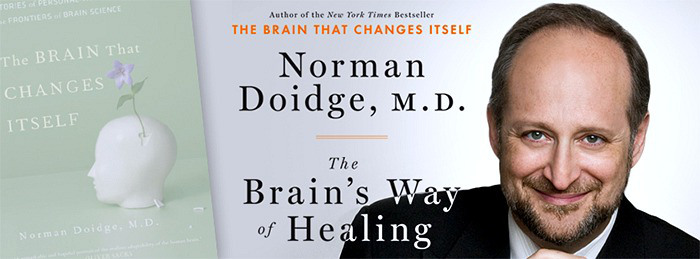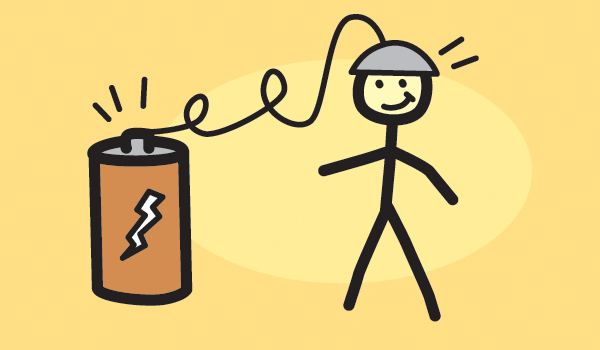 I am currently reading Norman Doidge’s latest book, The Brain’s Way of Healing: Remarkable Discoveries and Recoveries from the Frontiers of Neuroplasticity. It is a follow-on from his bestselling, The Brain That Changes Itself: Stories of Personal Triumph from the Frontiers of Brain Science, and is also full of marvelous stories of less-than-optimal brains being healed and made more functional. It is an exciting, exhilarating and inspiring book. It’s also making me depressed.
I am currently reading Norman Doidge’s latest book, The Brain’s Way of Healing: Remarkable Discoveries and Recoveries from the Frontiers of Neuroplasticity. It is a follow-on from his bestselling, The Brain That Changes Itself: Stories of Personal Triumph from the Frontiers of Brain Science, and is also full of marvelous stories of less-than-optimal brains being healed and made more functional. It is an exciting, exhilarating and inspiring book. It’s also making me depressed.
There are many different treatments being discussed in his book, which make me keen to try them for my children. I find myself thinking, “Oh, that intervention would help my daughter with her inability to concentrate”, or “Maybe that treatment would help my son finally be able to talk.” I get online and look them up, only to find that the treatment is out of our price range, or only available in the U.S., and I simply don’t have the money to pay for the treatment, let alone fly overseas.
Unfortunately that’s not a one-off occurrence. We’re a single-income family of eight with more debts than income. We have five children with extra needs, financial and otherwise, plus we are trying to provide a semi-normal life for our neurotypical daughter. I have my own health issues, which often leave me with no energy and far too little physical or emotional strength to care for my more challenging children. Some of you can probably add your own list to mine, as to why you can’t just ‘do it all’ for your children.
So, what CAN you do?
 Firstly, love yourself and stop beating yourself up for what you cannot do. Stop repeating those mental tapes that say, Iif only I did xyz intervention for my child, they would be so much better.” That only makes you feel worse, and you have absolutely no guarantee that any particular intervention would help YOUR child, regardless of how wonderful it sounds, how huge a success rate it’s had, or how much your best friend’s child improved on it.
Firstly, love yourself and stop beating yourself up for what you cannot do. Stop repeating those mental tapes that say, Iif only I did xyz intervention for my child, they would be so much better.” That only makes you feel worse, and you have absolutely no guarantee that any particular intervention would help YOUR child, regardless of how wonderful it sounds, how huge a success rate it’s had, or how much your best friend’s child improved on it.
Secondly, take care of your own health. You know that this is a marathon, and no doubt you’ve given self-care advice to friends on the same path as you. But are you living it? Are you really looking after yourself? Have you changed your diet to foods that are kind to your body? Are you exercising? Do you spend time in a hobby (other than research)? Do you get enough sleep? I know that’s hard when your child isn’t sleeping, but have you found creative ideas to get in a nap here or there, rather than catching up on the washing or cleaning? Are you seeing a doctor for your own health and taking your supplements? Doing your own detoxing right along with your child? Taking some time off (even if it’s only five minutes at a time) to recharge? If you are answering yes to all those questions and still feeling worn out or depressed, then it’s time to look at what you’re doing, and tweak your own healing path.
Thirdly, love your relationships. Whether they are with your partner, your children, your relatives or just your dog, take care of those relationships. It is hard to keep marriages alive, let alone thriving, when you have special-needs children in the house. Your friends change as you change, and while autism mothers ‘get’ what you are going through, sometimes it’s refreshing to have contact with friends who aren’t always talking about their children’s health. I know, that sounds sacrilegious, but just being able to go out and have a drink (beverage of choice allowed here) with someone who can get you to laugh and relax, can be worth an extra night’s sleep. Being able to spend some time laughing and cuddling with your children, and making beautiful memories, can be just as healing as trying to figure out the next supplement to trial, or the next intervention to start with.
Lastly, be realistic, and prioritise. We know how important it is to keep up to date with the latest findings, but that doesn’t mean that you have to research every single autism-related topic, all the time. Focus on a couple of areas and research those, and implement them one at a time. Make a list of things you’d like to find out more about and try with your child, when and if you are able to do them. Be realistic about what you can afford – you may not be able to take your child overseas for the latest stem cell treatments, but you might be able to afford a new supplement. Perhaps the $50,000 yearly price tag for ABA treatment is totally unrealistic, but you might be able to find an RDI therapist for a lot less and do most of the therapy yourself. You might want your child to go grain free, but you know that you don’t have the physical capability right now to spend all day in the kitchen cooking, so choose one meal a day that you can make grain free.
The important thing is to never give up. Don’t give up just because your child has passed their fifth birthday and is still not speaking. Don’t give up just because you’ve tried 70 different supplements and they’ve all made your child worse. Don’t give up when you’ve come to the end of a long day and you realise you have not said one positive thing to your child that day. Don’t give up when you realise you simply don’t have the money to be able to see your doctor this month.
Find the positives, no matter how small. Share the love you have – it’s free and doesn’t take much energy. Tell your child over and over how much you love them, and how you will do everything in your power to help them get better. Then go look in the mirror and tell yourself the same thing.
~Peacemaker
Peacemaker is a mum to six children. Three of her girls have been diagnosed with Asperger’s, and one of her sons has severe autism. Their quirky family lives in Australia, where every day presents a new dietary challenge. When she’s not busy homeschooling her kids, Peacemaker can be found researching autism, or reading a relaxing autism biography.
For more by Peacemaker, click here.


















Thanks for this enlightening article – not only giving parents a time to breathe but also ideas to be resourceful enough for their child’s condition as well their own welfare.
I absolutely LOVE this post. Too often parents are left feeling overwhelmed and guilty when presented with all the treatment options available today. (A different issue than the first generation of parents of newly diagnosed children, who had nothing available and no internet to educate themselves). Today we have an overflowing wealth of information and it’s so challenging to sort through. Thank you for sharing your perspective and the very real challenges parents face in trying to balance their own needs with those of their child with autism and the rest of the family. I agree that parent self-care and being able to focus on priorities is more helpful to all family members. And staying focused on the positives (I call them “celebrations”) is critical to staying motivated and doing more of what is working.
Rebecca Lee do you sell chelation supplies or something? Every single time I see a post from you that is literally all it says! It worked for your kid (assuming kid is real), great but really? How does that help a mother love herself and let go of guilt?
I do not sell a damn thing. I think that autism is usually mercury poisoning and the remedy is AC chelation. I have posted Cliff Notes on how to chelate on my website, and that for free, too. I moderate a Facebook group with 3,000 members and give away all my advice for free. As does Dr. Cutler for that matter. I don’t like to,see people beating their heads against the wall and suffering because they are lacking knowledge.
Chelate, chelate, chelate with the Andy Cutler protocol. Check out our Facebook group “Fight Autism and Win official group.”
Thank you Peacemaker for the timely and beautiful reminder.